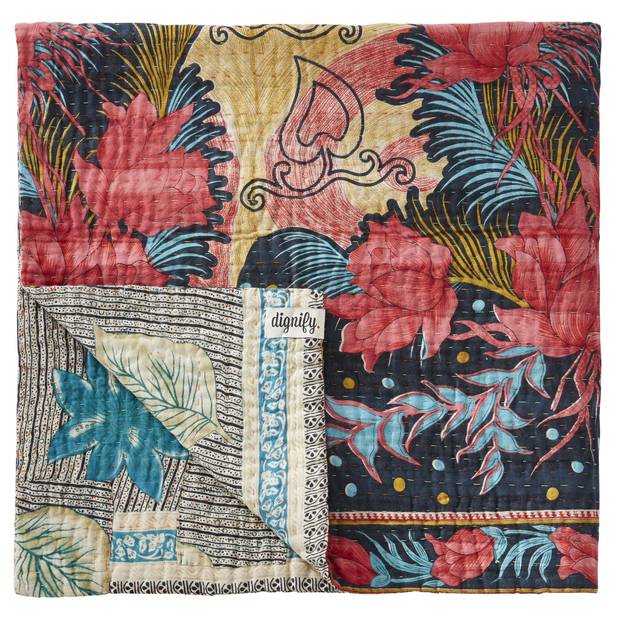As retailers scramble to address a shifting consumer consciousness, Holt Renfrew is doing its part for social responsibility. For the past four years, Alexandra Weston, Holt Renfrew's director of brand and creative strategy, has been curating collections of what she calls "extraordinary products with extraordinary stories." Dubbed H Project, it has previously celebrated the cultures and crafts of India, Africa and South America. In honour of our country's sesquicentennial and Holt's own 180th birthday, this year's range of women's apparel, accessories and home and beauty items focus on Canada.
Featuring fair-trade products like Dignify quilts and the ethically handcrafted fashions of Laura Siegel, the handmade eyewear of PEI-based Fellow Earthlings Sunglasses and custom creations by designers such as Smythe and Jenny Bird, H Project's Uncrate Canada collection is an eye-opening mix of the imaginative and ethically manufactured fare our designers produce. I spoke with Weston about her passion for H Project, what growing up as the granddaughter of the legendary Sonja Bata taught her, and how she manages motherhood and work.
You've featured India, Africa and South America previously. Tell me about your experience this year curating a Canadian collection.
When we're travelling abroad and looking at these amazing cultures, you can't help but reflect on what you have at home. So the more we started thinking about what exists, we started thinking about what stories are there at home that we haven't discovered. You put on blinders when you've been living here. I've been living here almost my whole life and the same designers' names keep coming up. What is Canadian design was really narrow, at least in my world. And then when I started curating for H Project, it immediately opened up what it could mean. I met Laura Seigel and Treana Peake from Obakki and started seeing brands within our country that I'd never been exposed to in the traditional Canadian fashion scene.

Fellow Earthlings aviators.
It must be daunting for a retailer to keep trying to tell new stories and be at the cutting edge of originality, while offering that inspiring experience to consumers.
What's so amazing about it is that it comes out of a real place: It doesn't come out of a brainstorm session about how we can get more foot traffic into the store. It came out of a genuine place where the world was changing and I was trying to see what our responsibility as a retailer was to offer these kinds of products. We're a house of many cards. It's our job to show our customers what's out there. There's a whole demographic – not an age demographic, but a mindset – that wants to understand the impact of our actions. How is that T-shirt I'm buying actually affecting someone else? I think especially for our customer, who has the means to understand that, who can travel, who is global in their mindset, they still like to see what's going on out there and understand the story behind it.
Your grandmother is Sonja Bata, who's passionate about artisanal craftsmanship and cross-cultural exploration. How does that background influence these creative concepts?
For me, it was very natural. I'm actually shocked sometimes. I have to pinch myself, saying, "Is this really what I'm doing?" I have old friends I've known my whole life who've come back after having moved away, and I'll explain what I'm working on and they say, "You know I'm so proud of you. I couldn't think of anything more fitting!" You are so fortunate if you find something you love doing. With my grandparents, I was so lucky as a very young girl. I got to travel to places that a lot of young kids don't get to travel to. At Christmas, we were visiting factories in India. I think seeing the world from the backseat of my grandparents' journey allowed me to understand what production and retail and manufacturing mean in different parts of the world. It helped me understand different cultures and see a bigger picture. So I have a fascination with retail but I also struggle with it because I can see some of the downside to it: the environmental concerns, the humanitarian issues, the waste. Fashion is a tough industry when those are things you care about.
How worried are you about retail's changing landscape and all the activity we're seeing in this country at this time?
I think if you have a clear vision, and a strong business strategy and you stay true to that and don't try and pretend to be something you're not or fill a gap that doesn't work for you, you'll find your niche. People are so split these days in music, in their taste, in their fashion. You have mashups of everything. So as long as you are very clear on your vision and what you stand for and who you are, your customer will continue to follow you.
You and your husband, Galen Weston Jr., have two children, aged six and seven. How are you juggling having a young family, working and keeping it all together?
I'm still trying to work part-time and I take the kids to school everyday, come hell or high water. That's really important to me. I try and pick them up as much as I can. I'm in the office during the week and I'm off on [Monday and] Friday. So come Friday, all I want to do is hug them 24 hours a day. I'm sort of guilt ridden that I haven't really been there to focus on them and throw myself into being mom. But my phone goes away on the weekend, and come Tuesday, I cannot wait to get into the office, put on some heels, get a coffee, open my computer and remember who I am and what I'm doing for myself.
This interview has been condensed and edited.



